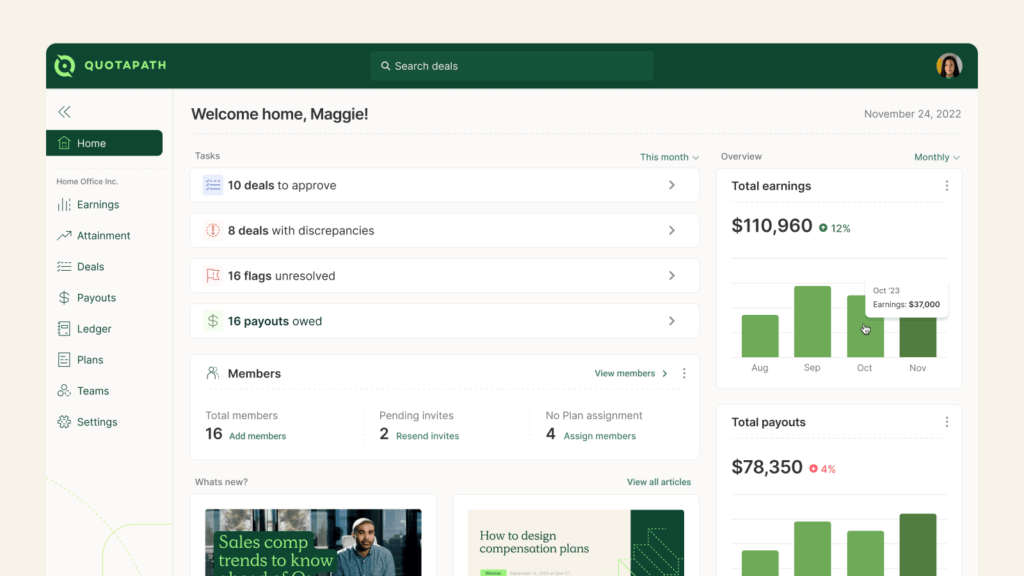Revenue leaders reported maintaining simplicity, getting team buy-in, and motivating reps as leading challenges when designing comp plans. That’s according to our report. But what problems pop up when it comes to sales compensation management?
After surveying more than 450 Finance, RevOps, and Sales leaders, 25% said alignment to business goals was where they needed the most improvement.
Simplifying the process (22%) and plan optimization (21%), or striking the right balance between cost efficiency and adequately incentivizing desired business outcomes, also ranked high.
Below, we explore improving sales incentive compensation management by addressing these key issues.
What is sales compensation management?
Sales compensation management is designing, implementing, and managing sales compensation plans. This includes setting targets, calculating commissions and bonuses, and ensuring the compensation plan aligns with the company’s overall sales goals and objectives by driving sales performance.
Aligning comp plans to business goals
Your sales compensation plan is one of the most essential tools to motivate and drive your sales team. It can help you achieve your goals faster and more efficiently when aligned with your key business objectives.
When done correctly, leaders:
- Improve sales performance: When sales reps are incentivized to achieve the most important goals of the business, you set the company and the rep up to be more successful.
- Reduce sales costs: A well-aligned sales compensation plan can reduce sales costs by reducing or eliminating the need to pay commissions on deals not great for the business.
- Increase employee satisfaction: Sales reps are more likely to be satisfied with their jobs when they feel like their work is valued and they are rewarded for achieving the most important goals of the business. This can lead to reduced turnover and a more motivated sales team.
In general, everyone understands the value of aligning comp plans. Yet, our report showed leaders struggle to do so.
This can be due to a lack of understanding of the business’s key objectives. Is the person or team responsible for designing comp plans in the meetings where business objectives are defined? If they aren’t, the risk of misalignment increases.
Additionally, if the responsibility for creating the compensation structure falls to sales leaders, they may focus on short-term results, such as meeting quarterly goals. When that happens, your plans fail to include metrics that work toward annual targets.
Some examples of misaligned comp plans might include paying a higher commission rate on products that don’t generate as much revenue as others or not offering multi-year accelerators if a core metric focuses on retention.
How to align your comp plans
- Set your business objectives first
- Establish a compensation committee that includes executive involvement
- Gather rep feedback on what’s working and what’s not
- Create comp plan components based on rep feedback and that push the objectives from No. 1
- Pressure test the plan
Simplify sales compensation management
In addition to misalignment, leaders noted overly complex plans as an area for improvement.
Twenty-two percent said reps find their comp plans tricky to understand, hindering the execution of their sales compensation management process.
If your organization doesn’t support reps with a source of truth for their earnings, attainment, and upcoming commission payments, you’re likely experiencing this issue, too.
One way to address this is by adopting sales compensation management software with rep access.
This gives reps real-time visibility into forecasted earnings, commissions to date, and a breakdown of their compensation plans to foster understanding. Plus, with a tool like QuotaPath, reps can raise questions in-app for faster answers and fixes. And you’re simplifying compensation management by automating tracking and commission payments.
You should also consider simplifying your commission plans. Leaders have a tendency to overcomplicate these as the proposals pass through leadership. Collaborate early on and try to limit your comp plans to three compensation components: a standard commission rate, an accelerator, and a milestone bonus, for example. The goal is to toe the line between keeping it simple and motivating your reps to overperform.
Plan optimization
The third area leaders want to see improvements in is implementing comp plans that optimize cost efficiency and motivate sellers.
This is challenging because your commission rates, bonuses, or SPIFs, have to be high enough to excite your reps but not too high where they break your financial model.
To overcome this, work with your department heads.
If Sales or RevOps is leading comp plan design, this would be an excellent time to bring Finance in. They can gauge whether or not your proposals would tank gross profit. It is better to find out early so you have plenty of time to re-work the plan components.
Rep feedback will also play a role because you must determine what motivates them.
For instance, if you’re mulling over paying a higher commission rate for multi-year deals, will a 1% increase be enough to get them to ask for longer terms? The answer will vary according to your average sales price. You may have to sell your reps on it with examples of what previous deals would have paid out.
To get their honest answers, talk about comp in regularly scheduled 1-on-1s, administer anonymous surveys, and include and communicate with them along the way.
Visibility and automation
Lastly, leaders said they want to increase visibility (17%) and adopt automation (15%) into their sales compensation management process.
In adopting a software sales compensation management platform like QuotaPath, you would address both, simplifying comp plan execution.
Sign up for a free trial to see our holistic views that serve up compensation tasks for managers and reps. Or schedule time with our team. Learn how QuotaPath can improve your approach, align, and execute sales compensation.




